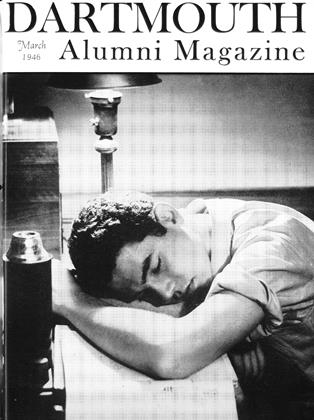I HAVE JUST RETURNED from seeing the Russian film, "The Fall of Berlin," which should give our rabble rousers against Russia pause. The picture was a stupendous display of power, and it was difficult to recognize a city, in which I once lived for eight months, from the piles of rubble shown on the screen. All this to introduce a book about another besieged city which once fell to Northern arms; in this instance, Richmond, Virginia. Alfred Hoyt Bill, working apparently in the Princeton Library, has produced The Beleaguered City. Richmond 1861-1865, published by Alfred A. Knopf, 1946. T. J. Wertenbaker, Edwards Professor of American History at Princeton, has this to say about it: "I find the book fascinating reading from beginning to end. It is as though one were present in Richmond during the exciting events from iB6O to 1865—the alternating hopes and fears of the people, the elation at the reports of victories, the anguish as the trainloads of wounded streamed in, the criticisms of President Davis and his the difficulties of getting food and clothing, etc. Under Mr. Bill's skillful hand Richmond comes alive again in this most interesting and tragic period of its history." I agree.
Another 1946 book, written with the deft touch of the born writer, is George Millar's Waiting in the Night, a story of the Maquis told by one of its leaders (Doubleday & Cos., Inc., 1946). Millar was dropped by parachute one night and organized part of the French underground around Dijon and There were many risks, of course, and this book of fact becomes more exciting than most thrillers. As the blurb states, the book is rich in personalities, and Boulaya, Pancheau, Le Frise give you more of an insight into France today than do the debates in the Chamber of Deputies which one reads about daily in The New YorkTimes. France will come back and this book explains, in part, why, though I hasten to say that all this is implicit in a story which is not burdened with pronouncements. All Millar tells is an excellent and exciting story.
Christopher Isherwood's Prater Violet (Random House, 1945) has been highly praised. It is good, for Isherwood, if you give him time out from perusing the Vedas, can write sparkling prose. In this story of the filming of an English motion picture, with an Austrian director, one can see the allegory of our times. If you can't find the allegory, which is all right with me, you will enjoy the story for its own sake.
If any of you collect mint United States issues of postage stamps you will find profitable reading, I think, in Thomas Young's Profit in Postage Stamps (New York, Bernard Ackerman, 1945).
Two good thrillers I recommend: Frances Crane's The Shocking Pink Hat (Random House, 1946) and a reprint issued by Pocket Books, Philip Mac Donald's Warrant For X.
One of my students presented me with David McCord's very cheerful anthology of American and British humorous and witty verse, What Cheer (Coward-McCann). One of his limericks struck my eye for it is about a place near home, Woodstock, Vermont. It goes like this: At the village emporium in Woodstock Of chutney they keep quite a good stock; They're more given to gluttony Than the folk of Ascutney Who neither of liquors nor foods talk.
And speaking of anthologies, of which there will never be an end, the best bargain I have seen lately is An Anthology ofFamous English and, American Poetry, a Modern Library Giant, edited by William Rose Benet and Conrad Aiken. In terms of space, Robert Frost comes third so far as American poets go, with Walt Whitman and Emily Dickinson first and second respectively. Aiken is very partial to Emily's poetry but had I been the chooser I would have had more of Frost than of either of the other two. This is a book of nearly 1,000 pages and it is a fine bargain at $1.45. Ezra Pound is among the missing and this was the publisher's responsibility and not Aiken's who insisted "that it be clearly stated in print that his wishes were overruled by the publishers, who flatly refused at this time to include a single line by Ezra Pound." I must confess that if sides are to be taken I should be with Aiken. I believe that, outside of Frost, Richard Eberhart '26 is the only Dartmouth poet included. There is not a line of Hovey's in the book.
Two first-class war books may be mentioned: Louis Hagen's Arnhem Lift (Farrar & Rinehart, Inc.) and Peter Bowman's Beach Red (Random House 1945).
 View Full Issue
View Full Issue
More From This Issue
-
 Class Notes
Class Notes1918
March 1946 By ERNEST H. EARLEY, DONALD L. BARR -
 Article
ArticleA Very Wise Man Once Gave Me a Gloomy Warning
March 1946 By WILLIAM H. MILLER JR. '49 -
 Class Notes
Class Notes1917
March 1946 By MOTT D. BROWN, DONALD BROOKS -
 Article
ArticleHANOVER HOLIDAY 1946
March 1946 By PROF. HERBERT W. HILL, -
 Class Notes
Class Notes1911
March 1946 By NATHANIEL G. BURLEIGH, EDWIN R. KEELER -
 Class Notes
Class Notes1919
March 1946 By J. KENNETH HUNTINGTON, MAX A. NORTON
HERBERT F. WEST '22
-
 Article
ArticleContemporary Novels
May 1934 By Herbert F. West '22 -
 Article
ArticleHanover Browsing
November 1939 By HERBERT F. WEST '22 -
 Books
BooksTWENTY MODERN AMERICANS
April 1943 By Herbert F. West '22 -
 Article
ArticleHanover Browsing
May 1947 By HERBERT F. WEST '22 -
 Article
ArticleHanover Browsing
May 1955 By HERBERT F. WEST '22 -
 Article
ArticleA Dartmouth Bookshelf
January 1958 By HERBERT F. WEST '22
Article
-
 Article
ArticleDARTMOUTH IN THE NEW HAMPSHIRE STATE GOVERNMENT
February 1917 -
 Article
ArticleOLD COLLEGE DIPLOMA RECEIVED
February, 1924 -
 Article
ArticleDanforth Fellows
APRIL 1969 -
 Article
ArticleTHE HANOVER SCENE
MARCH 1959 By BILL MCCARTER '19 -
 Article
ArticleTrack
May 1962 By DAVE ORR '57 -
 Article
ArticleFALL SCHEDULE
OCTOBER 1963 By DAVE ORR '57

